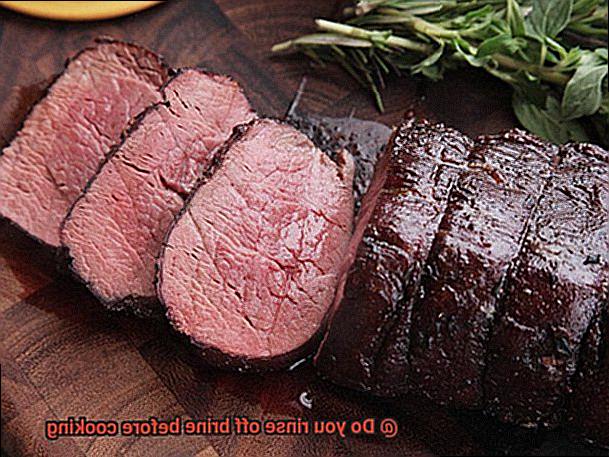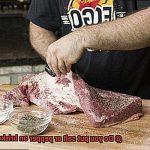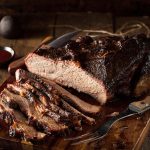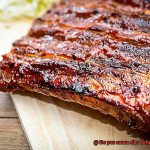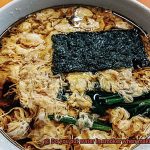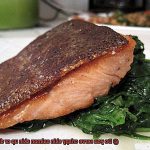Are you a fan of pickling and preserving your food for later use? If so, then you’re probably familiar with the term ‘brine.’ Brine is a mixture of salt, sugar, vinegar, and other flavorings that are used to preserve and flavor foods like meat, fish, and vegetables. But when it comes to cooking with brined food, there’s a common question that arises – should you rinse off the brine before cooking? Well, fear not. In this blog post, we’ll explore the answer to this question in detail.
First things first – why is brining such an essential method for preserving and flavoring food? Brining draws moisture out of the food and creates an inhospitable environment for bacteria, which helps to extend its shelf life. It also imparts flavor and makes the food more tender. So if the brining process has been done correctly, the food should already be seasoned and flavored to perfection.
However, rinsing off the brine before cooking can be a personal preference. Some people prefer to rinse off the brine to remove excess salt and sugar from their food. Others believe that it takes away from the flavor that was infused during the brining process. Ultimately, it all depends on your taste preferences and how the brined food was prepared.
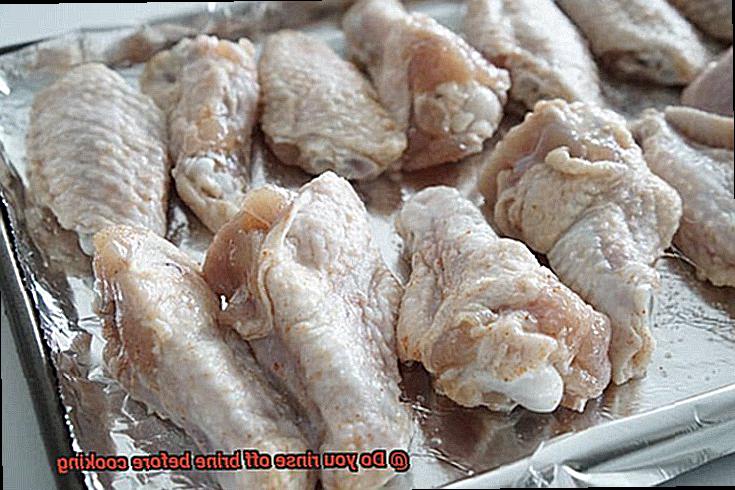
In this blog post, we’ll take a closer look at both sides of rinsing off brine before cooking. We’ll provide you with some useful tips to help you decide whether or not to rinse off your brined food before cooking. So if you’re ready to become a pro at all things brining-related, keep reading.
Contents
What is Brine?
Brine is more than just saltwater solution. It’s a magical elixir that can take your cooking to the next level. In essence, brine is a mixture of water and salt, with a ratio of one cup of salt per gallon of water. The process of brining involves soaking meat, poultry, or fish in this solution for a predetermined amount of time to enhance its flavor and texture.

But how does it work? Brining allows salt to penetrate the meat, breaking down muscle fibers and drawing out moisture. This process tenderizes the meat, making it juicy and flavorful. In addition to salt, brine can also contain sugar, herbs, and spices to add more complex flavors to the meat.
The length of time for brining varies based on the size and type of meat. A chicken breast may only need a few hours in a brine solution while a larger piece of beef or pork may need to soak overnight. It’s important to follow recipe specifications to avoid over-brining, which can result in overly salty meat.
One question that often comes up when using brine in cooking is whether or not to rinse off the solution before cooking. Some recipes call for rinsing off excess salt or seasoning that may have accumulated on the surface. Others suggest that rinsing can wash away flavor and moisture absorbed during the soaking process.
While it ultimately depends on personal preference and recipe specifications, it’s important to rinse minimally if you do decide to rinse off the brine. A thorough wash can remove too much of the brine and negatively impact the taste and texture of the meat.
Benefits of Brining Meat
Brining has been used for centuries to keep meat moist and flavorful during cooking. Not only does it work wonders in retaining moisture, but it also enhances the taste of your dish and tenderizes tougher cuts of meat.
Let’s break down the benefits of brining meat a little further.
Firstly, brining keeps meat moist during cooking. The salt in the brine breaks down muscle fibers in the meat, allowing it to retain more water and remain juicy. This is especially helpful when cooking leaner cuts of meat like chicken breasts or pork loin that have a tendency to dry out quickly.
Secondly, brining enhances the flavor of your meat. The salt and sugar in the brine penetrate the meat, infusing it with a delicious taste that is hard to resist. By adding additional herbs and spices such as rosemary, thyme, or garlic, you can take the flavor profile up a notch.
Thirdly, brining tenderizes tougher cuts of meat. By breaking down muscle fibers in the meat, the brine can help to make it more tender and easier to chew. This is especially useful when preparing cuts like brisket or flank steak that can be tough and chewy if not cooked properly.
Lastly, brining reduces cooking time. Since the meat has already absorbed some moisture from the brine, it will cook more quickly and evenly than if it had not been brined. This is particularly useful when grilling or roasting larger cuts of meat that often take a long time to cook through.
In summary, there are many benefits to using a brine before cooking your meat. From keeping it moist and flavorful to reducing cooking time and tenderizing tougher cuts, brining is a technique worth considering. And don’t forget, while some people choose to rinse off the brine before cooking, leaving it on can actually enhance the flavor and texture of your meat.
Does Rinsing Off the Brine Remove Flavor and Moisture?
Brining is a culinary tradition that has been passed down for generations. It involves submerging meat in a saltwater solution, which not only enhances its flavor but also keeps it moist during cooking. However, when it comes to rinsing off the brine before cooking, opinions are divided. So, does rinsing off the brine remove flavor and moisture?
Let’s start with flavor – one of the primary reasons for brining. Some people argue that washing off the brine will also wash away all the flavors that have seeped into the meat. However, this is not entirely accurate. While some of the salt and other seasonings in the brine may be washed away, the flavors have already penetrated the meat and will still be present. Hence, rinsing off the brine doesn’t necessarily mean losing all the flavors you’ve worked so hard to infuse into your meat.
Now let’s talk about moisture. The science behind brining is that saltwater solution breaks down the muscle fibers in meats, allowing them to absorb more water and hence retain moisture during cooking. Some people worry that rinsing off the brine will undo all this hard work, resulting in a dry end product. But again, this is not necessarily true either. While some moisture may indeed be lost during the rinsing process, it’s essential to remember that the meat has already absorbed a significant amount of moisture from the brine. Moreover, any excess moisture on the surface of the meat will evaporate quickly during cooking at high heat.
So should you rinse off your brined meat before cooking? It ultimately depends on personal preference and recipe specifics. If you’re concerned about an overly salty taste, then rinsing off some of the brine may be beneficial. However, if you want maximum flavor and moisture retention, leaving the brine on is recommended.
Should You Rinse Off the Brine Before Cooking?
That is the question when it comes to cooking with brine. Brining is the process of soaking meat in a solution of salt and water (sometimes with other ingredients added for flavor) before cooking. The salt in the brine helps to break down the muscle fibers in the meat, making it more tender and juicy when cooked, as well as infusing it with flavor.
But should you rinse off the brine before cooking? The answer isn’t always straightforward and depends on a few factors.
First and foremost, consider the type of meat you’re cooking. If it’s something like chicken or pork, there’s no need to rinse off the brine before cooking. The salt in the brine has already done its job of penetrating the meat and infusing it with flavor and moisture. However, if you’re working with more delicate meats like fish or seafood, rinsing off some of the excess salt and seasoning could be helpful to prevent over-seasoning.

Another factor to consider is the type of brine you’re using. If your brine is heavily seasoned or overly salty, rinsing off some of the excess salt and seasoning could help balance out flavors. However, if your brine is relatively mild, there’s no need to rinse off any of the flavors you worked so hard to infuse into your meat.
Finally, think about how you plan on cooking your meat. If you’re using a dry heat method like grilling or broiling, excess moisture from the brine could make it difficult to achieve a crispy exterior. In this case, patting your meat dry with a paper towel before cooking could help ensure that you get that crispy crust you’re looking for.
How to Quickly and Minimally Rinse Off the Brine
Brining meat is a fantastic way to add flavor and moisture to your dishes. However, when it comes time to cook, you may need to rinse off the brine. While some chefs argue that rinsing off the brine can remove some of the flavor and moisture, others swear by it. If you decide to rinse off your brined meat, there are a few tips and tricks you can use to do so quickly and minimally.
Avoid Over-Brining
One of the best ways to avoid the need for a thorough rinse is not to over-brine your meat in the first place. Over-brining can lead to an overly salty taste and texture, which may make rinsing off the brine more necessary.
Use Cold Water
When rinsing off the brine, cold water is your best friend. It’s essential to use cold water instead of hot water, as hot water can start cooking the meat prematurely and wash away more of the flavor and moisture from the brine.
Be Gentle
Be sure not to scrub or rub the meat too vigorously when rinsing off the excess brine. This can damage the surface and affect its texture. Instead, use a slow, steady stream of water while handling it with a gentle touch.
Pat Dry
Once you have rinsed off the brine, pat your meat dry with paper towels or a clean cloth. This will help remove any excess moisture and ensure that your meat is evenly coated with any rubs or seasonings you plan to use.
Try Quick Soak or Colander Method
There are two quick methods for rinsing off brine: The quick soak method and using a colander or strainer. For quick soak, fill a large bowl with cold water, place your meat inside, swish it around gently for a few minutes, then remove it from the water and pat it dry. For the colander method, place your meat in the colander and run cold water over it for a few seconds.
Pros and Cons of Rinsing Off the Brine Before Cooking
When it comes to cooking with brine, there’s an age-old debate on whether or not to rinse off the brine before cooking. Some swear by leaving it on, while others believe rinsing it off is the key to a delicious and juicy meal. So, let’s explore the pros and cons of rinsing off the brine before cooking.
First up, the pros. Rinsing off the brine can:
- Lower the sodium content: Brine is a saltwater solution used to enhance flavor and moisture in meat, but it can also make meat extremely salty. By rinsing off the excess brine, you can reduce the overall sodium content and make your meal healthier.
- Give you better control over flavor: Rinsing off the brine can also give you better control over the overall flavor of your dish. If you find that your meat is too salty after brining, rinsing it off can help balance out the flavors and prevent it from being overpowering.
- Help achieve a crispy texture: When you rinse off the brine, it can also help your meat achieve a crispy texture when cooked. This is because excess moisture from the brine can prevent a crispy crust from forming on the outside of meat.
However, there are also some cons to consider when rinsing off the brine:
- Remove moisture: One of the main reasons people use brine is to add moisture to their meat. Rinsing off the brine can remove some of this moisture and potentially lead to a drier final product.
- Remove flavor: Similarly, rinsing off the brine can also remove some of the flavor that was added during the brining process. This can result in a less flavorful final product.
- Be time-consuming: Rinsing off the excess brine can be time-consuming and may add an extra step to your cooking process.
So, what’s the verdict? Ultimately, whether or not to rinse off the brine before cooking is up to personal preference. It’s important to consider the pros and cons and decide what works best for you and your dish.
If you do decide to rinse off the brine, don’t worry. Here are some tips to make it quick and efficient:
- Avoid over-brining
- Use cold water
- Be gentle
- Pat dry
- Try the quick soak or colander method
Other Tips for Successful Brining
Brining is an excellent way to enhance the flavor and tenderness of your meat and poultry dishes. However, there are a few additional tips to keep in mind for a successful brining experience. Here are five sub-sections to expand upon these tips:
Use the Right Salt
Choosing the right type of salt is crucial when it comes to brining. Kosher salt or sea salt are the best options because they dissolve easily and do not contain any additives that could impact the final taste of the meat. The type of salt you use affects the overall flavor, so make sure you use the right one.
Use Enough Liquid
The amount of liquid used in the brine is also critical. You want to ensure that the meat is fully submerged for maximum flavor absorption. A good rule of thumb is to use one cup of salt per gallon of water, but feel free to experiment with different ratios to find what works best for you.
Brine for the Correct Amount of Time
Different types of meat require specific brining times, so be sure to follow recipe guidelines or do some research on optimal brining times for various meats. While chicken or pork chops may only need a few hours in the brine, larger cuts like whole turkeys or roasts may require up to 24 hours for maximum flavor infusion.
Don’t Forget About Seasoning
While salt adds plenty of flavor, adding herbs, spices, and aromatics such as garlic or bay leaves can take your brined meats to another level. Be careful not to overdo it, though—too much seasoning can overpower the natural flavors of the meat.
Select the Right Container
Choosing a container that can fully submerge your meat or poultry is essential for successful brining. Non-reactive containers such as plastic or stainless steel are best because reactive containers such as aluminum or copper can cause off-flavors in the brine.
Refrigerate While Brining
Refrigerating your meat or poultry while it’s brining is crucial to prevent bacterial growth and ensure the meat stays safe to eat. Keeping it at a consistent temperature below 40°F is ideal.
KCrioLODf5g” >
Conclusion
In conclusion, brining is a tried and true method for elevating the flavor and juiciness of your meat dishes. But when it comes to rinsing off the brine before cooking, opinions are divided. Some argue that rinsing can strip away essential moisture and flavor while others believe it’s necessary to reduce sodium levels and achieve desired taste.
Ultimately, whether or not you rinse off the brine depends on several factors such as the type of meat, the type of brine used, and your personal preference. If you do choose to rinse off the brine, there are some quick and easy tips to follow for efficient rinsing. Be gentle when handling the meat, use cold water, pat dry after rinsing, and try either a quick soak or colander method.
For optimal results with brining, use kosher salt or sea salt for maximum flavor absorption. Ensure that your meat is fully submerged in enough liquid and follow recipe guidelines for ideal brining times. Don’t forget about seasoning but be careful not to overpower natural flavors. When it comes to containers for brining, opt for non-reactive materials like plastic or stainless steel and always refrigerate during the process.

